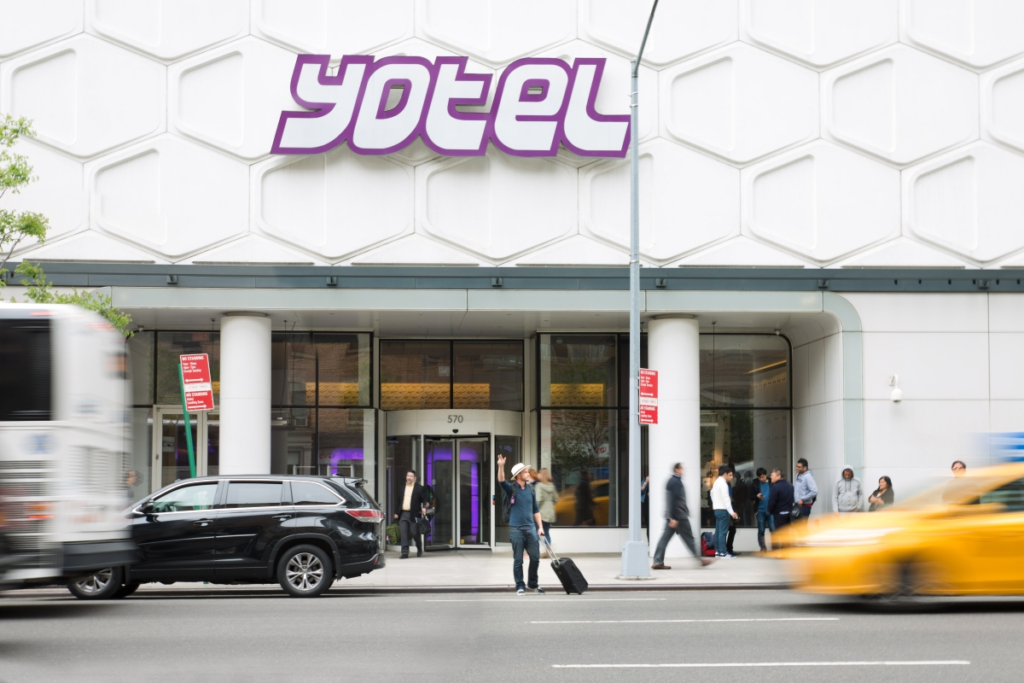YotelFollowing a change of ownership structure, the UK-based hospitality company enters a phase of expansion.
Al Bahar Group increased its stake by 30% to 95% after acquiring additional shares from Starwood Capital. Hubert Viriot According to the brand, the new governance structure will enable it to make more decisive decisions as they aim to double their global portfolio of rooms to 15,000 by 2030.
Viriot told Skift that “These investors are very knowledgeable about the Yotel business and are familiar with it.” They have seen the company’s growth and realized that there is still much to be done, and it still has a great deal of potential.
Viriot says that the joint venture was previously structured as a joint-venture with Starwood Capital Group and Al Bahar Group. The change has brought “more agility” to the company and allows it to focus on long-term goals without being pressured by short-term returns.
He explained that “when we look at the longer-term strategy of our business, we can have a bit more freedom in what direction we go, in which markets and in the types of contracts we take on.”
Strategic Growth in Established Markets
Yotel is focusing on growing within the regions in which it has already established a presence, rather than trying to expand into new markets. This strategy involves expanding its footprint by focusing on regional clusters and feeder market, particularly in Asia and Europe.
Viriot stated that the real goal is to focus on existing markets and grow in them, rather than continue to expand into new ones.
Yotel, for example, has opened hotels in Singapore and is now targeting countries nearby like Thailand, Malaysia and Indonesia, to create a regional property network and reinforce the brand’s visibility.
Yotel also adjusts its growth model according to the maturity of the market. In established markets it will prioritise management contracts. However, in regions that are newer and less saturated, like Japan, they may opt for franchise agreements or partnerships.
Market Volatility
Yotel operates 23 hotels across its portfolio in 16 cities, airports and countries around the world. Eleven more hotels are set to open within the next two-years.
Viriot is pragmatic, despite the uncertain macroeconomic outlook, especially with increasing international tensions, fluctuating travel demand and rising prices.
What business wants is stability. He said that tourists want to know the future. “Decisions have been stalled and so on. We may see an immediate impact in the short term, but will it have a lasting effect? “I don’t believe so. I don’t know.”
Hybrid hospitality as a growth engine
Yotel’s future is dependent on its strategy of three brands. The Yotel brand is geared towards urban travelers. YotelAir focuses on high-traffic travel centers, like airports. YotelPad is their newest concept and combines hotel services with residential elements.
While YotelAir remains a niche but high-performing segment — especially in locations like Istanbul — the bulk of current and future growth is concentrated in Yotel’s city hotels and the newer YotelPad format.
Viriot stated that “YotelPad is a great opportunity and we’ve already started to tap into it. I think the future of hospitality will be increasingly hybrid, in a sense,”
This trend is in line with the broader industry trends, which are a growing demand for flexible-use, long-stay properties from both investors and travelers.
This is also reflected by a recent Skift MegatrendMany hotel companies are looking at ways to capitalize on the growing demand for hybrid travel experiences, which combine short and long-term stays.
Yotel’s portfolio is currently at around 85% occupancy. Some airport properties are regularly operating in triple digits during peak hours. Viriot said that the average daily rate for Yotel is $185 globally. He noted that internal performance metrics have exceeded expectations.
Innovation in Tech and Real Estate Strategy
Yotel has been doubling down innovation, not only in the guest experience but also how hotels are constructed and operated.
The company is testing a completely automated guest experience in its London Stratford hotels.
Viriot said, “It’s a fully-automated experience. Our customers can navigate their stay entirely on their own, from checking in to entering the hotel and ordering without any human help.” If they require human assistance, there is always someone to help, but we want the experience to be so seamless that no one will need it.
Yotel is committed to converting underused office buildings in hotels. This strategy aligns both with environmental goals and the advantages of a quick time-to market. Regulatory hurdles can often cause these projects to be delayed.
Yotel also has success in converting unbranded properties, especially in Europe, to branded properties which meet its service and design standards.
Viriot explained that in Europe there are a number of unbranded hotel chains where the room sizes tend to be quite small. “We can convert existing hotels in Europe to Yotel standards, and the process is easier than expected.”


